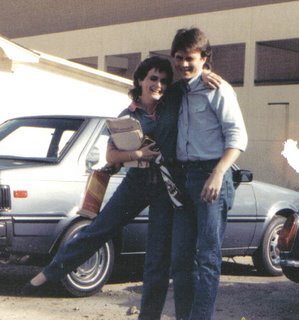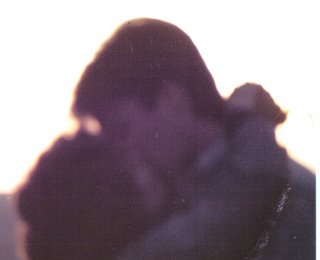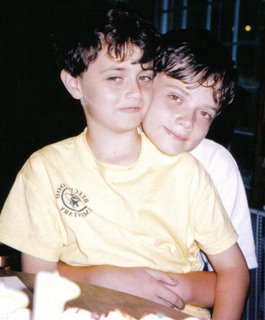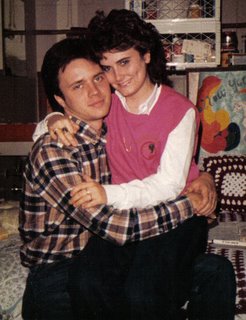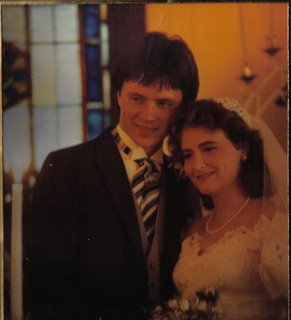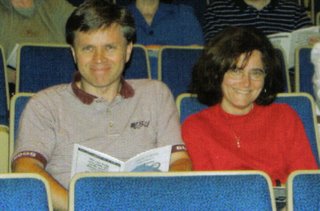BAGHDAD, Iraq -
Abu Musab al-Zarqawi, the al-Qaida leader in Iraq who waged a bloody campaign of suicide bombings and beheadings, was killed overnight by F-16 jets dropping two 500-pound bombs, U.S. and Iraqi officials said Thursday. It was a long-sought victory in the war in Iraq.
Al-Zarqawi and seven aides, including spiritual adviser Sheik Abdul Rahman, were killed inside a building in a remote area 30 miles northeast of Baghdad, officials said.
U.S. military spokesman Maj. Gen. William Caldwell showed what he said was a picture of al-Zarqawi after he was killed, and a videotape of an attack in which he said F-16 fighter jets dropped two 500-pound bombs on the site. "We had absolutely no doubt whatsoever that Zarqawi was in the house," Caldwell said.
‘Painstaking intelligence effort’The spokesman said U.S. and Iraqi intelligence found al-Zarqawi by following his spiritual adviser.
“Through a painstaking intelligence effort, we were able to start tracking him, monitor his movements and establish when he was doing his linkup with al-Zarqawi,” he said. “What everyone needs to understand is the strike last night did not occur in a 24-hour period.”
Caldwell also said U.S. and Iraqi troops carried out 17 raids around Baghdad following al-Zarqawi's killing.
“It truly was a very long, painstaking, deliberate exploitation of intelligence, information gathering, human sources, electronics, signal intelligence that was done over a period of time, many, many weeks,” Caldwell said.
Earlier Thursday, Prime Minister Nouri al-Maliki had called a press conference to announce that “al-Zarqawi was terminated.”
At the White House,
President Bush hailed the killing as “a severe blow to al-Qaida and it is a significant victory in the war on terror.”
But he cautioned, “We have tough days ahead of us in Iraq that will require the continuing patience of the American people.”
Al-Qaida in Iraq confirmed al-Zarqawi’s death and vowed to continue its “holy war,” according to a statement posted on a Web site.
“We want to give you the joyous news of the martyrdom of the mujahed sheik Abu Musab al-Zarqawi.
“The death of our leaders is life for us. It will only increase our persistence in continuing holy war so that the word of God will be supreme.”
Identification effortsGen. George Casey, the top U.S. commander in Iraq, said the hunt for al-Zarqawi began two weeks ago, and his body was identified by fingerprints and facial recognition.
Forensic experts are conducting a DNA test on Zarqawi and results are expected in 48 hours, he said.
There were six people in the house bombed by U.S. warplanes, including a woman and a child, but only Zarqawi and Abdul-Rahman have been identified. Zarqawi’s identification was verified at 3:30 a.m. ET on Thursday, Caldwell said.
Two photographs of the corpse of the bearded Zarqawi with his eyes shut were displayed at the news conference. His body lay in a pool of blood. His nostrils were filled with blood and there were gashes to his cheek and forehead.
Video from the scene of the attack showed children scrambling over a flattened jumble of cinderblocks, concrete reinforcing bars, blankets, blue plastic bowls and other debris. A pickup truck was scorched and crushed.
Two young members of the crowd held up a child’s sandal, a backpack with a teddy bear on it and a stuffed animal. The rubble was across a dirt road from a grove of palm trees.
Jordanian intelligenceThe news came amid more reports of violence in Iraq, with three bombs in Baghdad
killing at least 25 people and wounding more than 55.The announcement about al-Zarqawi’s death came six days after he issued an audiotape on the Internet, railing against Shiites in Iraq and saying militias were raping women and killing Sunnis. He urged the community to fight back.
The Jordanian-born terrorist was Iraq’s most-wanted militant — as notorious as Osama bin Laden, to whom he swore allegiance in 2004. The United States put a $25 million bounty on his head, the same as bin Laden. Al-Maliki told al-Arabiya television the bounty would be honored, saying “we will meet our promise,” without elaborating. Al-Zarqawi is believed to have beheaded two Americans — Nicholas Berg of West Chester, Pa., and Eugene Armstrong, formerly of Hillsdale, Mich. — prompting supporters to dub him “the slaughtering sheik.”
Al-Maliki said the Wednesday night airstrike by U.S. forces was based on intelligence reports provided to Iraqi security forces by area residents.
A Jordanian official said the kingdom also provided the U.S. military with information that helped track down al-Zarqawi, who claimed responsibility for a November triple suicide bombing against Amman hotels that killed 60.
The official, who spoke on condition of anonymity because he was addressing intelligence issues, would not elaborate, but Jordan is known to have agents operating in Iraq to hunt down Islamic militants.
Some of the information came from Jordan’s sources inside Iraq and led the U.S. military to the area of Baqouba, the official said. 'An open battle'Iraqi Foreign Minister Hoshyar Zebari said a serious effort to find al-Zarqawi had been underway since he appeared in a videotape in late April — the same week messages were broadcast by bin Laden and his top deputy, Ayman al-Zawahri.
He said the location in which al-Zarqawi appeared in the videotape had been “pinpointed,” without elaborating.
Baqouba has in recent weeks seen a spike in sectarian violence, including the discovery of 17 severed heads in fruit boxes. It also was near the site of a sectarian atrocity last week in which masked gunmen killed 21 Shiites, including a dozen students pulled from minibuses, after separating out four Sunni Arabs. “Those who disrupt the course of life, like al-Zarqawi, will have a tragic end,” al-Maliki said. He also warned those who would follow the militant’s lead that “whenever there is a new al-Zarqawi, we will kill him.”
“This is a message for all those who embrace violence, killing and destruction to stop and to (retreat) before it’s too late,” he said. “It is an open battle with all those who incite sectarianism.”
A U.S. defense intelligence official, who requested anonymity while events were unfolding, said there is no intelligence indicating that extremists planned attacks that would be triggered by al-Zarqawi’s death.
However, the official said, with his death, there may be some retaliation.
Blair: 'A significant step'It was not clear to American authorities who would succeed al-Zarqawi as the leader of al-Qaida in Iraq. The official noted that a number of al-Zarqawi’s deputies have been taken out in recent months, which could cause chaos among the group’s top tier.
In London, British Prime Minister Tony Blair said al-Zarqawi’s death “was very good news because a blow against al-Qaida in Iraq was a blow against al-Qaida everywhere.”
In Jordan,
al-Zarqawi’s older brother said the insurgent leader was a martyr, and the family had long expected his death. Al-Zarqawi’s family had renounced him in the wake of the Amman bombings.
Al-Zarqawi oversaw a wave of kidnappings of foreigners and the killings of at least a dozen, including Arab diplomats and three Americans. He also was a master Internet propagandist, spreading the call for Islamic extremists to join the “jihad,” or holy war, in Iraq. His group posted gruesome images of beheadings, speeches by al-Zarqawi and recruitment videos depicting the planning and execution of its most daring attacks.
Iraqi citizens had mixed reactions to the news of al-Zarqawi’s death.
Thamir Abdulhussein, a college student in Baghdad, said he hoped the killing would promote peace between the fractured ethnic and sectarian groups.
“If it’s true al-Zarqawi was killed, that will be a big happiness for all the Iraqis,” he said. “He was behind all the killings of Sunni and Shiites. Iraqis should now move toward reconciliation. They should stop the violence.”
Amir Muhammed Ali, a 45-year-old stock broker in Baghdad, was skeptical that al-Zarqawi’s death would end the unrelenting sectarian violence and said the Iraqi resistance to U.S.-led forces likely would continue.
“He didn’t represent the resistance, someone will replace him and the operations will go on,” he said.
Missed chancesIn the past year, al-Zarqawi moved his campaign beyond Iraq’s borders to Jordan and Lebanon, where he claimed responsibility for a rocket attack from Lebanon into northern Israel.
U.S. forces and their allies came close to capturing al-Zarqawi several times since his campaign began in mid-2003.
The closest brush may have come in late 2004. Deputy Interior Ministry Maj. Gen. Hussein Kamal said Iraqi security forces caught al-Zarqawi near the insurgent stronghold of Fallujah but then released him because they did not realize who he was.
In May 2005, Web statements by his group said al-Zarqawi had been wounded in fighting with Americans and was being treated in a hospital abroad — raising speculation over a successor among his lieutenants. But days later, a statement said al-Zarqawi was fine and had returned to Iraq. There was never any independent confirmation that he was wounded.
U.S. forces believe they just missed capturing al-Zarqawi in a Feb. 20, 2005, raid in which troops closed in on his vehicle west of Baghdad near the Euphrates River. His driver and another associate were captured and al-Zarqawi’s computer was seized along with pistols and ammunition.
© 2006 The Associated Press. All rights reserved. This material may not be published, broadcast, rewritten or redistributed.
